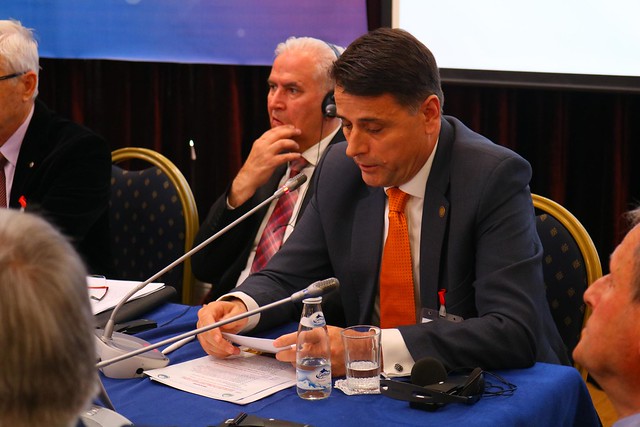Tirana, Albania—UPF-Albania organized a Balkan Leadership Conference on the theme “Good Governance and Sustainable Peace in the Balkans: The Necessity of Cooperation—The Challenge of Integration.”
The conference, held on March 30, 2019, at the Tirana International Hotel, brought together 120 participants, including former heads of state and government from Albania, Bosnia and Herzegovina, Croatia and Kosovo, and more than 30 members of parliament from Albania, Kosovo and North Macedonia.
The meeting laid the foundation for the Europe and Middle East Summit to be held by UPF in Tirana, Albania, on October 25-27, 2019.
The presence of former Balkan heads of state and the gathering of Albanian parliamentarians from both ruling and opposition parties, at a time of enduring conflict in the Albanian Parliament, raised the interest of the local media, which covered the whole event with a “live” broadcast.
The first session was moderated by Dr. Gaqo Apostoli, a former minister of transportation and the current chair of UPF in Albania. Dr. Katsumi Otsuka, the chair of UPF for Europe and the Middle East, greeted participants on behalf of UPF and reported about the recent World Summit 2019 held in Korea, which was attended by most participants on the panel.
Former Albanian President Alfred Moisiu reviewed some of the challenges faced by his own country and Balkan nations. He pointed to nationalistic trends and outside influence, recalling the Balkan history and regretting a lack of will to find common solutions.
Former Croatian President Stjepan Mesic emphasized the need for Balkan nations to gain a new European identity through joining the European Union, to develop bilateral ties as a first step toward integration, and to get rid of mutual mistrust and what he called “legends and myths which we treat as historical facts.”
Former Albanian President Rexhep Meidani assessed the status of Balkan nations applying to join the European Union and the North Atlantic Treaty Organization (NATO), evaluating the period needed to complete the process and recommending more interaction to counter foreign influence preventing integration.
Former Kosovan President Fatmir Sejdiu denounced the pressure exerted against his country in the name of a dialogue that seeks to challenge the independence of Kosovo. At the same time, he said, the country needs to strengthen youth education and the fight against organized crime.
Former President Zivko Budimir of Bosnia and Herzegovina spoke about the challenges resulting from the political configuration of his country inherited from the Dayton Agreement. It weakens democracy, he said, and leaves people with less and less hope for change in the face of pressure from foreign influence.
Former Prime Minister Bajram Kosumi of Kosovo spoke about the option of a federation of the “four small states in the Balkans”—Albania, Kosovo, Montenegro and North Macedonia—none of which is in the position to claim hegemony, he said. Such a federation would empower them politically, economically and militarily in the face of a hostile environment, he said.
Concluding the session, Dr. Michael Balcomb, the chair for Europe and the Middle East of the Family Federation for World Peace and Unification, an organization affiliated with UPF, announced the plan to hold the Europe and Middle East Summit 2019 in Tirana in October and to invite UPF co-founder Dr. Hak Ja Han Moon to give the keynote address.
At the end of the session Hon. Gaqo Apostoli read the resolution to hold the summit in Tirana in October, which then was signed by all participants.
The second session, on the theme “Parliamentarian Diplomacy and the Role of Parliamentarians for Peace,” was moderated by Hon. Shezai Rrokaj, coordinator of the Albanian chapter of the International Association of Parliamentarians for Peace (IAPP).
Mr. Jack Corley, head of UPF in Eastern Europe, gave introductory remarks on IAPP’s vision to address issues through bipartisan cooperation and governance.
Then seven members of parliament, representing three Balkan nations, including both ruling and opposition parties in Albania and Kosovo, offered their perspective for sustainable development in their country and the Balkan region.
From Albania: Professor Dr. Vasilika Hysi, deputy chair of Parliament; Hon. Dashamir Shehi, Professor Dr. Mimoza Hafizi, and Hon. Rajmonda Stefa, members of Parliament.
From Kosovo: H.E. Jakup Krasniqi, former chair of Parliament, and Hon. Albin Kurti, member of Parliament and leader of the opposition party.
From North Macedonia: Hon. Gjylymsere Kasapi, a member of Parliament.
Mr. Jacques Marion, secretary general of UPF-Europe, concluded with remarks on the significance of holding this upcoming summit in the Balkans.
During the discussion that followed, participants suggested various themes that the summit could address.
The event was reported regularly in the news in the following days, including interviews with the former presidents of Albania who attended the meeting.

